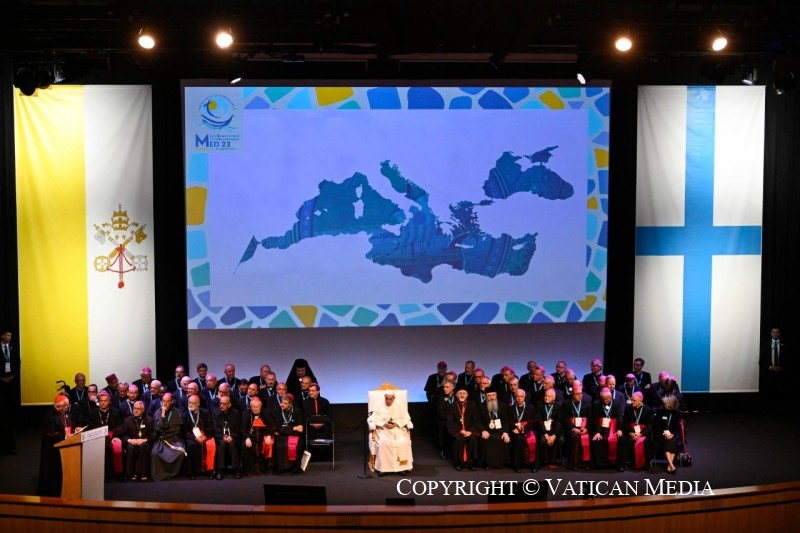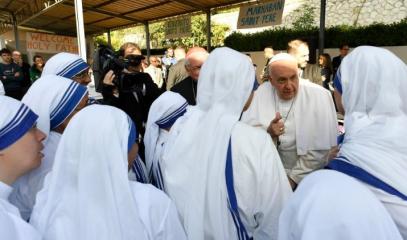Pope in Marseille: Mediterranean must no longer be the graveyard of dignity
After the meeting with society's most vulnerable in the house of Mother Teresa's nuns, the speech at the Rencontres Méditerranéennes. "Just saying 'enough' to migration means turning a blind eye to the future: integration is tiring, but it prepares the future." The invitation to the Churches of the different shores of the Mediterranean: evaluate the opportunity of a joint Episcopal Conference.
Marseille (AsiaNews) - "History calls us to have a leap of conscience to prevent a shipwreck of civilization." Pope Francis' message from Marseille today was strong and clear, delievered druing his address at the final session of the Rencontres Méditerranéennes which in recent days was attended by sixty bishops and a representation of young people from the "five shores of the sea": North Africa , Balkans, Latin Europe, Black Sea and Middle East.
Once again the pontiff recalled the urgency of listening to "the cry of pain that is transforming the mare nostrum into mare mortuum, the Mediterranean from the cradle of civilization to the graveyard of dignity".
Migration is one of the great themes at the center of the Pope's Marseille pilgrimage, who already yesterday, in front of the memorial dedicated to the sailors and migrants who died at sea, had defined the measures to hinder the work of NGOs as "gestures of hatred against the brother disguised as balance”.
This morning - after having met privately at the house of the Missionaries of Charity with some people in situations of economic hardship - Francis broadened his reflection to the vocation of dialogue of the Mediterranean, "a place where different countries and realities meet on the basis of the humanity that we all share , not of opposing ideologies" and a context that "expresses a thought that is not uniform and ideological, but multifaceted and adhering to reality", as opposed to "antiquated and belligerent nationalisms".
The Pope spoke after listening to the testimony of two participants in the Rencontres: the bishop of Tirana Msgr. Arjan Dodaj, who grew up under atheist communism and himself a former child who emigrated to Italy, where he rediscovered his faith, and the young Mariaserena, an Italian who has been living in Greece for two years with the Pope John XXIII Community, in a family home that welcomes people migrants.
Pope Francis began his speech by thanking "young people, the present and future of the Church and society", which was then developed starting from three key words linked to the reality of Marseille, a city which "since its origins has had a composite and cosmopolitan character" : the sea, the port and the lighthouse.
“The mare nostrum is a meeting space: between the Abrahamic religions; between Greek, Latin and Arabic thought; between science, philosophy and law", said the pontiff, who cited the intuition of the "great mayor Giorgio La Pira" and the words of Monsignor Tonino Bello.
Just as "the Galilee of the people was the seat of the universal announcement of the Beatitudes, this perennial Sea of Galilee invites us to oppose the divisiveness of conflicts with the conviviality of differences".
Moreover, "the mare nostrum is an outpost of challenges that concern everyone: a mirror of the world that carries within itself a global vocation to brotherhood". The place to begin to make room for peace is “the shores of the Sea of Galilee, Jesus began by giving hope to the poor: we need to start again from there, from the often silent cry of the last”.
The Pope cited "material, educational, working, cultural and religious poverty" where "the terrain of mafias and illicit trafficking is levelled", but also "the decline in care" and the contexts in which "Christians do not enjoy full citizenship". And, of course, the cry of pain of migrants, faced with "various Mediterranean ports that have closed".
Underlining that the urgency of welcoming in the face of inequalities has been at the center of the Church's heartfelt attention "for more than fifty years", Francis - who cited, among other things, Saint Paul VI in his Populorum Progressio - spoke on political current affairs: “Two words resonated, fueling people's fears: 'invasion' and 'emergency'.
But the migration phenomenon is a fact of our times, a process that must be governed with wise foresight." On the eve of World Migrant and Refugee Day, reiterating "the right both to emigrate and not to emigrate", the pontiff stated: "The solution is not to reject, but to ensure, according to each individual's possibilities, a large number of entries legal and regular, sustainable thanks to a fair welcome on the European continent, in the context of collaboration with the countries of origin. Saying 'enough', however, is closing our eyes" to "future generations". Because "integration is tiring, but far-sighted: it prepares the future which, like it or not, will be together or not".
Recalling the responsibility of Christian testimony in this sense, Francis recalled the example of Saint Charles de Foucauld, "universal brother", of the martyrs of Algeria, "but also of many charity workers today".
In reference to the image of the lighthouse, then, the question: "Which light trails can guide the route of the Mediterranean Churches?". Among the possible concrete responses, the Pope cited "more synergistic paths" between the Mediterranean Churches and dioceses, on the topic of migration and beyond, "also evaluating the opportunity of a Conference of Mediterranean Bishops".
Above all, it is necessary to give space to young people - "they are the light that indicates the future route" -, starting with the "priority challenge of education": "Mediterranean universities are laboratories of dreams and construction sites of the future, where young people mature meeting, getting to know each other and discovering nearby and different cultures and contexts. In this way, prejudices are broken down and fundamentalist rhetoric, which is very fashionable today, is avoided."
Finally, Pope Francis cited "the challenge of a Mediterranean theology" - at the center of some specific moments of the Rencontres - "which develops a thought adhering to reality and capable of promoting with originality the ecumenical path between Christians and dialogue between believers of different religions."
To the bishops and young people who listened to him, including a young Lebanese woman who sang a touching Christian song at the end of the meeting, the pontiff said that he was "a sea of good, a welcoming port, a beacon of peace, to cleave, through the culture of encounter, the dark abysses of violence and war”.
22/09/2023 15:15








.png)










